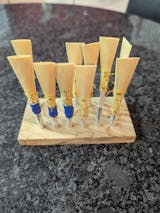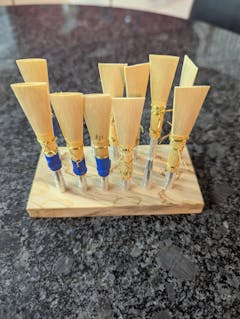FAQs
We offer an extensive range of bassoon reeds catering to different skill levels - beginner, intermediate, and professional. Our reeds are crafted to cater to a variety of playing styles and musical genres ensuring a versatile selection for all bassoonists. Generally as the reeds become more expensive they are aimed at a higher level of oboist.
The lifespan of an bassoon reed largely depends on how often it's played and looked after, but on average, a reed should be replaced every 3-6 weeks with regular playing. However, if you notice a decline in sound quality, responsiveness or the reed has chunks missing / is damaged, it might be time for a replacement regardless of the time frame. If an bassoon reed has visible mould on it (black or darkened areas) you should immediately stop using it as ingesting this can cause illness.
It's best to store bassoon reeds in a dedicated reed case that holds them securely to prevent damage, and allows for air circulation to keep them dry. Storing them in a cool, dry environment away from direct sunlight will also prolong their longevity.
Yes, bassoon reeds can be adjusted to better suit your playing preferences. With the appropriate reed making tools, adjustments can be made to the tip opening, spine, or heart of the reed to alter the resistance and tone. Have a look at our free bassoon reed adjusting guide.
Our bassoon reeds are meticulously crafted by highly experienced reed makers. Each reed goes through a thorough quality control process to ensure consistent playability, response, and tone quality. They are used by bassoonists of all standards, including in professional orchestras, across the world.
Our bassoon reeds are crafted from high-quality Arundo Donax cane, known for its excellent vibrational qualities and longevity, ensuring a reliable performance through the life of the reed.
Choosing the right strength reed is a nuanced decision that depends on your skill level, embouchure strength, and personal playing style. Beginners may find softer reeds easier to play, while advanced players might opt for medium reeds for more control and a fuller sound. We sell some reeds in multiple strengths, take a look at the product page. If you are a student we would suggest one of our student bassoon reeds.
We have tried many plastic reeds, from the cheapest to the most expensive. Unfortunately, we have found the cheaper reeds to be terrible and the most expensive, whilst they sometimes can sound a play faily well, to be lacking in tone and very inconsistent (which can mean a lot of money wasted!). At one time we did offer some of the expensive options however the resounding customer response was overall negative and for this reason we do not recommend them at this time.








